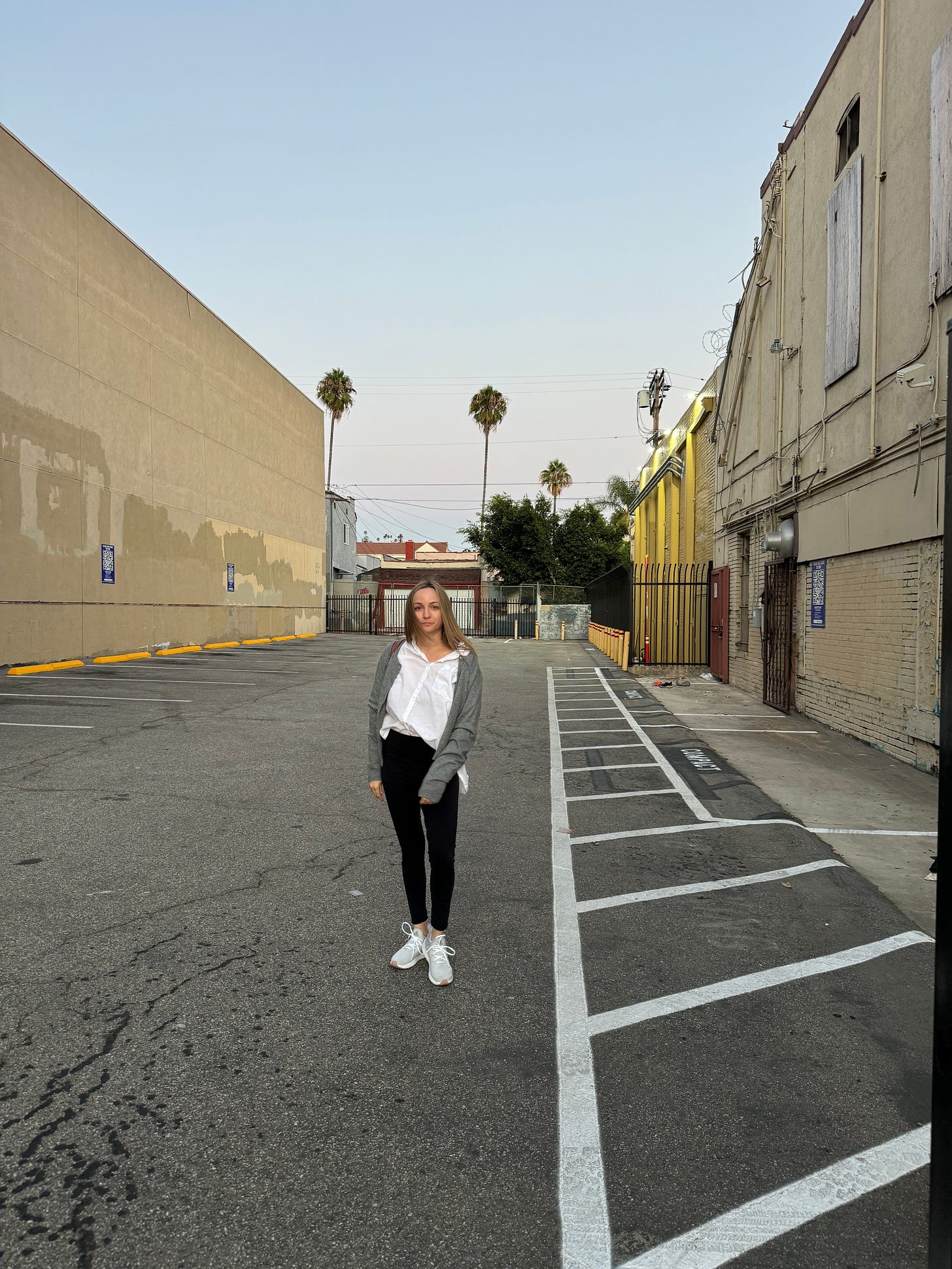12 questions to structure your novel
but i did it for my own life
1. What is the main character’s gift?
The main character’s gift is that she’s a writer. She’s able to process trauma through her work, through sitting down at her kitchen table and typing words onto a screen in an effort to make sense of some wrought feelings from the past, from the present, from feelings that are, as she continues to age, often projected into her future. The writing has allowed her to survive, thus far. The writing has been what draws her to others, what draws others to her. She has been able to recognize the gift and employ it in the realm of teaching, which, to be completely honest, she is not quite feeling anymore. Yes, I guess that’s it; she does not want to teach anymore. At least in the capacity of college writing, she wants to leave teaching. But how else to use the gift? How else to make money and have stability? It feels like readers are only interested when the gift is being used for, I guess the word would be clout, or more so for influence, mastery, dominance, authority. But what if she just wants to use the gift for her own survival? What if the gift does not propel her out of her own life, but instead, simply keep her afloat?
2. What is the character’s flaw?
The character’s flaw is her Obsessive Compulsive Personality Disorder. Oh boy, this was a fun diagnosis. She had been misdiagnosed as Bipolar back in 2022, but that was because she was having an OCD spike, which was confused for a manic episode, which was caused by an OCD attack triggered by her second book being rejected by her publisher. She had been driving to Pilates and had to turn the car around and drive instead to the nearest hospital. The publisher had asked for more time after the allotted 30 days. And then after another 30, they still had not reached a decision. But then, on a Tuesday, her agent emailed her the forwarded rejection from the publisher. The email started with, “This is a hard note to write.” She still has the email starred for some reason. Maybe this is part of her OCD. Anyway, the agent responded on her behalf: “She’s got readers and she’s got fans, so we’ll see to it that they get her next book and the ones after that.”
Is the OCD the extreme negative of her writing? Perhaps, since writing is chaotic and comes from the divine (or at least she believes so) and the OCD is aimed at order and comes not from God but from, well, she doesn’t exactly know, but she understands it’s not God’s voice, not even her own voice, but something else. And maybe having OCD isn’t relatable because it’s so specific, but she wonders, then, if it is at all relevant.
How does her OCD help move her story along?
3. What does the character want?
Her “want” is tied to the OCD. It has to do with the narrative she’s been telling herself for years, the story of her own life that she’s created and come to believe. The narrative is that she is not good. She is wrong. There is something wrong with her, deeply wrong with her. Everyone sees it. Everyone knows it.
But she often wonders if this is enough to make people (or readers, whatever) care about her, to vicariously fight for her, sympathize with her. Do people identify with her? (lol). She laughs because on Saturday night, she attended a healing Sound Bath. During the sound bathing process, she kept having a recurring thought that her want was actually just to feel special. She had previously thought she wanted to be seen, or respected, or admired, but now she realized that that wasn’t enough. She wanted to be special. And that was kind of embarrassing, but also brave maybe, but also kind of sad.
She has a family who loves her, and she has friends who love her, and she has people in her life who are supportive and caring. But was that enough? Was that special? What did being special even really mean?
But the want is supposed to be tangible and active, rather than deep and emotional. So, in that case, maybe here it’s that she wants to publish another book. She feels annoying saying “another,” but whatever, she’s saying it. She wants the chance to publish again because she feels like the last time, she didn’t get to do it right. She wants a do-over. She wants all the hard work she’s being doing to pay off. She wants another book.
4. What does the character need?
She needs a handful of Rold Gold pretzels. She needs a circle of strangers all chanting the serenity prayer. She needs another athletic dress. No. The character’s need is important because it teaches the reader about how to survive the world, and it only work if the character almost doesn’t survive. This sounds hard. Especially since it’s something the character is usually unaware of, something that they need in order to grow and reach their full potential, to culminate their arc. Oh Lord, that really sounds hard.
Speaking of ‘oh Lord,’ what she needs is faith. Her husband is always telling her she needs to have faith. “I find your lack of faith disturbing,” says Darth Vader in Star Wars Episode IV: A New Hope. Sofie Royer sings those words again in her song “99 Glimpses.”
She needs faith to be happy, to be a better person, to love herself, to have courage and offer kindness, to have the ability to face the truth, whatever it may be. She needs faith in order to embark on the journey of wanting to publish another book. She needs faith to sit down and write, to carve out the time, to do the physical act of it, but also she needs faith to believe that what she is doing will come to fruition, that what she is creating is important and necessary and virtuous and worthwhile. She has to have faith that her work is worthy.
5. What is the character arc?
If the arc should be thought of in terms of a negative to a positive, then perhaps her arc is from self-loathing to self-love. Or maybe, cynical to encouraged. Better yet, spiraling to receiving.
6. What is the inciting incident?
In this case, (and she is only ready to talk about this because the healing Sound Bath sort of worked its magic,) the inciting incident is that she is again setting off on the journey of querying for a new agent.
This shit has surely disturbed the status quo. The balance within the main character’s world has been upset. But is this the first 25% of the book? Is this still only the first quarter of her story?
In that case, was the inciting incident moving from NY to Florida? Or was it not getting into her dream school for college? Or was it growing up in a family of addiction? Does this incident have to happen at age 25? At age 25, she jumped out of a plane with her brother. She was in graduate school. She was dating someone and it would not work out in the long run. She was living at home. She was finishing her first book. She had no idea what her future would or would not look like.
But if we’re going to act as if this, the present, the now, is the space of the story, then I guess the inciting incident is that she had to unfortunately and gently part from her agent whom she had adored very much but, as her primal yoga teacher often says, it just didn’t work out.
7. Who is the antagonist?
Oh, this one is easy: the publishing industry! YES. Finally she can share a bit about how the publishing industry is the antagonist. Publishing is an actual, physical foe; a strong, dimensional, tension-bearing source of conflict that forces the protagonist to change.
How does publishing interfere with what the protagonist wants? Well, for starters, it’s been so damn hard to publish a second novel, and this is not something the main character can conceive of on her own. She only has so much control over the outcome. All she can do is write and work hard, which is not enough.
Let’s pretend that it’s okay to get into this next thing. Let’s say that her campus novel, which is about a Jewish sorority girl at a college in the Midwest, hasn’t yet found a home, and let’s just say that it was suggested she instead write a tell-all about sorority life, which maybe does sound good, but also is not at all the book she wrote nor intended to write.
So the book was sent out elsewhere. And she can’t help but wonder how often her queries were ignored because her characters are Jewish, because she is Jewish. Does being Jewish prevent her from her goal of publishing another book?
Someone once suggested she remove such details from her query letter, from any pitch she were to send out, but then wouldn’t an agent or publisher eventually discover the fact of her culture and religion and know anyway? If anyone in a position of power ever told her to deny that truth, well, she would tell them to kindly fuck off.
And while she is ruminating on the publishing industry as an antagonist, she might as well mention her confusion at what publishing has become: everyone participating in the same interviews for the same outlets and getting the same press and reading at the same stores with the same co-readers and acquiring the same blurbs and thinking the same thoughts and everyones’ brains becoming a mirror and same same same. This definitely feels like antagonistic energy to her. Writers matching their outfits to their books, wearing designer clothing for their launch parties. What are they doing? How is this writing? How is this honest? Or is it not supposed to be anymore? Writers becoming addicted to their phone, addicted to social media, addicted to their inboxes. Writers becoming other things than writers.
She guesses she can relate. She got wrapped up in it, too, with her novel. She spoke in tongues during interviews and her loss of self is what continues to drive her to the next book, to another opportunity to do it more honestly, more real, the most real. She wants to be real. She understands that in order to win, she has to trick the industry into letting her do it, that she has to play a part in it. She gets that. She knows.
She had a dream last night that she was stuck in an elevator with another woman. When the elevator door finally opened at a floor to let them out safely, the other woman left and the main character stayed. She pressed her floor again and waited to see what would happen, if this time it would work out in her favor.
8. How does setting help define or contrast with the story problem?
Another easy one. California. Los Angeles. The city where people go to have their dreams come true. A city that embodies glitz and glam yet holds broken souls. We are all broken yet striving. We are dreaming and fantasizing and showing up and making it happen and bitter with random bouts of positive healing energy, especially post Sound Bath, and we are in it together yet we all hate each other.
9. What style of writing will you use to tell the story?
When she hears the word “style” she automatically thinks of the harrowing realization that she still has no personal style. What is her style? She knows what it’s not. She’s too told for the athletic dresses that got her though summer and she’s too young for colorfully stitched trousers and she’s averse to patterned blouses and denim jackets and wide leg pants. She’s a teacher, during the day, and a mom all the time, and a writer when the coffee hits and none of these selves can seem to get themselves together to put on an outfit for a quick Target run.
Amidst this dissolution, or rather amidst this qualm of identifying self, she hopes that the writing might bode well to reflect such inner clamor. The person on the pages will feel scattered and the writing will feel like an amalgamation, like opening the mail after a long trip away. She hopes she reads like a coupon that has not yet expired.
10. What is the dark night of the soul?
The dark night of the soul was when she traded breakfast for bone broth and black coffee and ran on fumes to teach at the renowned university and the housekeeper who told her she looked “amazing since losing that belly,” who we did not ask to come back after that even though she wasn’t wrong. She felt amazing after losing the belly.
It was walking up twelve flights of stairs to her therapist’s office because she was only two months postpartum and wanted to fit into jean shorts by the end of the summer. It was the smell of her husband cooking breakfast while our daughter bounced in the BabyBjörn. Turkey bacon, eggs, honey poured into little cups of yogurt. It was a cold brew with a splash of oat milk that got her from morning to afternoon.
All the while, it was the emails that weren’t coming. There had been so many rejections that fall, that winter. On the last day of the winter semester, an agent whom she had been hoping and praying for emailed that it wasn’t the right fit. Students were about to file into the room as she composed a pathetic email to ask more questions, to ask to speak on the phone, to ask for more consideration. The baby kicked in her belly and she wanted to kick herself for putting her and her daughter through this rejection. She was so mad that the baby might feel it, the pain of this kind of despair.
All seemed lost. There was a collapse of perceived meaning.
11. What is the climax?
She wants the climax to be getting an agent, which she did, but that didn’t work out either. It’s a sucky situation because the two of them got along like peas and carrots, but there is more and it’s not for here and so the climax that she thought was the climax is not the climax. A book deal would be nice too, but you sort of need the agent first to do that.
So, what else? Let’s go back. Was it giving birth? Was it almost dying in the hospital? Was it needing emergency surgery? Was it moving to Tennessee? Was it moving back to California? All of these moments were major, full of propulsion from one realm to another. But when she arrived at the threshold of each, she was still the same. She was still spiraling and not yet receiving. Which is where she remains today. Even last night she took a spiral so deep it caused her to question everything.
Maybe this is something that will continue to happen in her story. Maybe she will face this climax of Why bother? Why even try so hard? over and over again and it will actually never go away or dissipate. Maybe it’s like the enemy in a story, the force of evil that the hero needs so they can have a worthy opponent.
But even now, something has to bend.
Maybe it’s like when she went to see Koyaanisqatsi in the theater and it was more than she’d bargained for. It ran for 86 minutes and consisted of a montage of visuals with a minimalist score, no narration or dialogue. One scene, which to her felt like the climax of the flim itself, began with a sunset reflected on a skyscraper. It was a segue to show people interacting with modern technology: traffic, rush hour, the labor of technology. Manufacturing cars in as assembly line. Time-lapses channel-surfing television shows. Close-ups on people where the camera only jolts away locking eyes with the device.
The best translation she can find for the word is “life out of balance.”
If the climax is the turning point, the most pivotal moment at the peak of the story arc that pits the protagonist against her opposition force in order to resolve the main conflict once and for all, then she guesses, here we are.
Other definitions for koyaanisqatsi: crazy life, life in turmoil, life disintegrating, a state of life that calls for another way of living.
12. What is the theme?
She is asked to state the theme as a cause/effect sentence, in terms of character arc.
If she can find faith, find it and hold onto it, find it and believe in it, believe that this is what’s meant for her and meant to be, then she can counter the spiral in order to receive the love she deserves, the love she is worthy of, the love that was created and bound just for her.
She has had so many chances, so many opportunities.
Still, she will try again.
—
*Shoutout to Anna Dorn & Francesca Lia Block for the structrue here
Proud to have some creative nonfiction up at Farewell Transmission. “Fool’s Gold” is a snapshot of a mid 90’s family vacation, an Arizona dream of horse-drawn wagon rides and panning for gold, a splash of Lisa Frank souvenir stickers and sacred stones kept in a velvet bag, cigarette smoke swirling over it all.
Come join me Write or Die’s inaugural CARPOOL on Wednesday, October 23rd. “Parenting is one of the most enriching and illuminating experiences, yet it is also full of challenges and trials. Take, for example, finding the time to create and make art. Regardless of what stage of parenthood you’re in, we want to create space for conversations and room to share our struggles and our joy together. There will be group discussions, writing prompts, short readings, and time to chill, breathe, and reflect. CARPOOL is open to all parent writers. We will meet seasonally online with a few in-person meetings in the Los Angeles area. We hope to build this group so that many parents in many different places can connect and meet and laugh and cry and write.” **message me for more info!
The Jumpoff is going strong with our second prompt on “writing ourselves into a new season!” Would love to know your vibe for Fall 2024!!
Such a lovely chat with Emily Layden “On Clearing the Noise of Publication, Getting off the Grid, Music as a Parallel to Writing, and Her Novel, ‘Once More From The Top’” for Write or Die.
And I’ve got another Lighthouse Writers Seminar coming your way: Writing the Non-Human on Saturday, November 2nd @ 9am PST/ 10am MDT/ 12pm EST.











Terrific idea for structure for an article. Your writing is beautiful and vulnerable. Thank you for sharing.
You are so talented it literally makes my heart grow